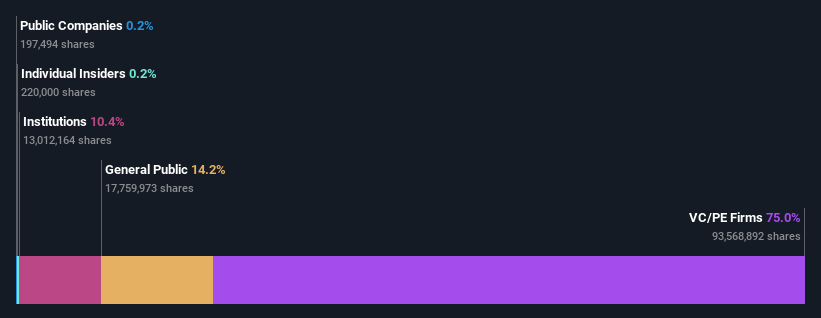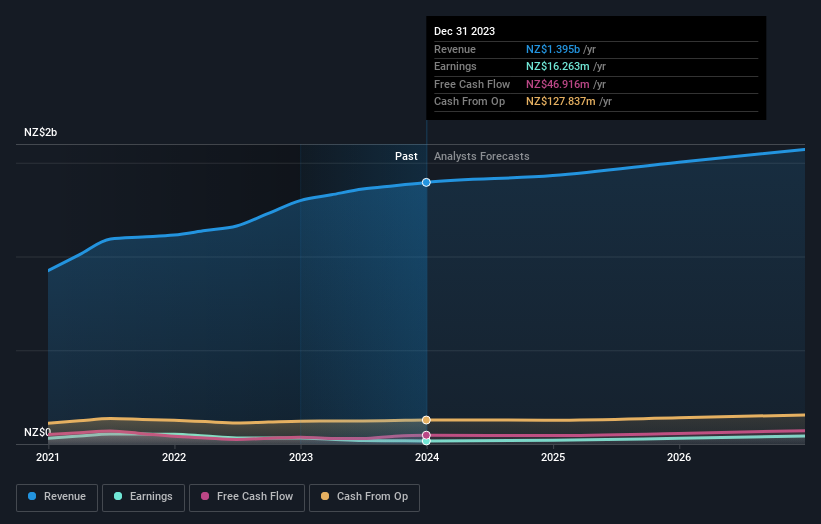Restaurant Brands New Zealand Limited's (NZSE:RBD) largest shareholders are private equity firms with 75% ownership, individual investors own 14%
Key Insights
The considerable ownership by private equity firms in Restaurant Brands New Zealand indicates that they collectively have a greater say in management and business strategy
Finaccess Capital owns 75% of the company
Institutional ownership in Restaurant Brands New Zealand is 10%
To get a sense of who is truly in control of Restaurant Brands New Zealand Limited (NZSE:RBD), it is important to understand the ownership structure of the business. With 75% stake, private equity firms possess the maximum shares in the company. That is, the group stands to benefit the most if the stock rises (or lose the most if there is a downturn).
And individual investors on the other hand have a 14% ownership in the company.
Let's delve deeper into each type of owner of Restaurant Brands New Zealand, beginning with the chart below.
See our latest analysis for Restaurant Brands New Zealand
What Does The Institutional Ownership Tell Us About Restaurant Brands New Zealand?
Institutional investors commonly compare their own returns to the returns of a commonly followed index. So they generally do consider buying larger companies that are included in the relevant benchmark index.
As you can see, institutional investors have a fair amount of stake in Restaurant Brands New Zealand. This suggests some credibility amongst professional investors. But we can't rely on that fact alone since institutions make bad investments sometimes, just like everyone does. When multiple institutions own a stock, there's always a risk that they are in a 'crowded trade'. When such a trade goes wrong, multiple parties may compete to sell stock fast. This risk is higher in a company without a history of growth. You can see Restaurant Brands New Zealand's historic earnings and revenue below, but keep in mind there's always more to the story.
Hedge funds don't have many shares in Restaurant Brands New Zealand. Finaccess Capital is currently the largest shareholder, with 75% of shares outstanding. This implies that they have majority interest control of the future of the company. With 3.0% and 2.6% of the shares outstanding respectively, Fidelity International Ltd and JPMorgan Chase & Co, Private Banking and Investment Banking Investments are the second and third largest shareholders.
While studying institutional ownership for a company can add value to your research, it is also a good practice to research analyst recommendations to get a deeper understand of a stock's expected performance. There is a little analyst coverage of the stock, but not much. So there is room for it to gain more coverage.
Insider Ownership Of Restaurant Brands New Zealand
The definition of an insider can differ slightly between different countries, but members of the board of directors always count. Company management run the business, but the CEO will answer to the board, even if he or she is a member of it.
Insider ownership is positive when it signals leadership are thinking like the true owners of the company. However, high insider ownership can also give immense power to a small group within the company. This can be negative in some circumstances.
Our information suggests that Restaurant Brands New Zealand Limited insiders own under 1% of the company. It has a market capitalization of just NZ$418m, and the board has only NZ$737k worth of shares in their own names. Many tend to prefer to see a board with bigger shareholdings. A good next step might be to take a look at this free summary of insider buying and selling.
General Public Ownership
The general public-- including retail investors -- own 14% stake in the company, and hence can't easily be ignored. While this group can't necessarily call the shots, it can certainly have a real influence on how the company is run.
Private Equity Ownership
With an ownership of 75%, private equity firms are in a position to play a role in shaping corporate strategy with a focus on value creation. Some might like this, because private equity are sometimes activists who hold management accountable. But other times, private equity is selling out, having taking the company public.
Next Steps:
It's always worth thinking about the different groups who own shares in a company. But to understand Restaurant Brands New Zealand better, we need to consider many other factors. Take risks for example - Restaurant Brands New Zealand has 3 warning signs (and 1 which is significant) we think you should know about.
But ultimately it is the future, not the past, that will determine how well the owners of this business will do. Therefore we think it advisable to take a look at this free report showing whether analysts are predicting a brighter future.
NB: Figures in this article are calculated using data from the last twelve months, which refer to the 12-month period ending on the last date of the month the financial statement is dated. This may not be consistent with full year annual report figures.
Have feedback on this article? Concerned about the content? Get in touch with us directly. Alternatively, email editorial-team (at) simplywallst.com.
This article by Simply Wall St is general in nature. We provide commentary based on historical data and analyst forecasts only using an unbiased methodology and our articles are not intended to be financial advice. It does not constitute a recommendation to buy or sell any stock, and does not take account of your objectives, or your financial situation. We aim to bring you long-term focused analysis driven by fundamental data. Note that our analysis may not factor in the latest price-sensitive company announcements or qualitative material. Simply Wall St has no position in any stocks mentioned.

 Yahoo Finance
Yahoo Finance 

